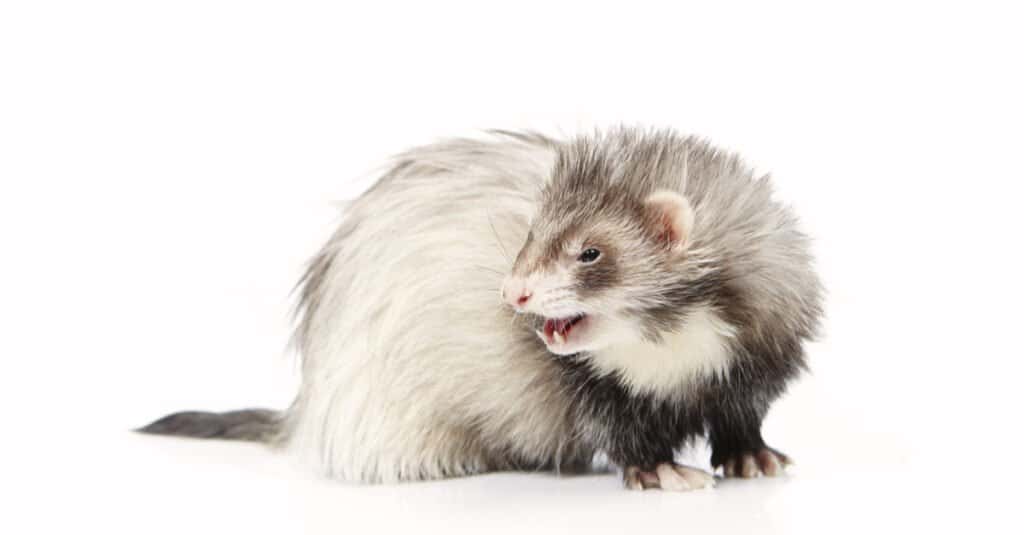Ferret sizes range from 1-6 pounds and 18-22 inches in length, including their tail. The size of your ferret depends on genetics, gender, and whether they’re intact, spayed, or neutered. Ferrets naturally gain weight in the winter and lose it in the spring.
In this article, we’ll discuss everything there is to know about ferret weights and lengths, from our ferret size chart to what to do if you suspect your ferret is overweight.
Ferret Size Chart

Ferrets can grow up to six pounds.
©Couperfield/Shutterstock.com
The table below shows the average ferret weights at key points in their life—birth, adoption (8-16 weeks), and adult size (6-10 months).
Remember that your ferret may not fall precisely into these ranges, and this doesn’t mean they’re unhealthy! There are many reasons a ferret’s weight may seem unordinary, all of which we’ll dive into below.
For now, just know that feeding your ferret a healthy, carnivorous diet and steady weight gain as they grow is most important.
| Female Weight | Male Weight | |
|---|---|---|
| Birth | 8-12 grams | 8-12 grams |
| 8 weeks | 300-500 grams | 400-500 grams |
| 16 weeks | 600-900 grams | 1000-2000 grams |
| 4 months | 1-3.5 pounds | 2-3.5 pounds |
| 10+ months | 1.5-3 pounds | 3-6 pounds |
How Big is a Full-Grown Ferret?
Full-grown ferrets can weigh anywhere from one to six pounds. Ferret weights range depending on breeding, gender, whether they’re intact, and even the season! Most ferrets in the United States, unfortunately, are mass-bred by a ferret mill. However, ferrets from reputable breeders may vary in size depending on genetics, as may ferrets in other countries where breeding is more widespread.
Male ferrets are larger than females, and intact males tend to grow larger than any other ferrets. Neutered males will be smaller than intact males, especially since neutering tends to happen at a very young age in the United States. Female ferrets weigh approximately 1-3.5 pounds, while neutered male ferrets weigh 2-3.5 pounds, and unneutered males can weigh up to six pounds.
In the winter, ferrets pack on extra pounds and may gain up to 40% of their normal body weight. In the spring, this weight will be lost. This fluctuation is completely normal and healthy. If your ferret’s weight fluctuates outside of this, see your veterinarian immediately. A little bit of weight loss is a lot for such a small creature and can indicate a health problem.
How Long do Ferrets Get?

Ferrets grow to lengths of 14-22 inches, including their tails.
©Sergei Avdeev/Shutterstock.com
Ferrets are long, slinky creatures—so you might wonder just how long they grow! There is actually no record kept for the world’s longest ferret because Guinness World Records doesn’t want to promote the mistreatment of ferrets.
However, the average length for female ferrets is around 13.5-14 inches without their tail and 18 inches with their tail. Male ferrets grow 14-15 inches without their tail and 22 inches with their tail.
When are Ferrets Fully Grown?
Ferrets are considered fully grown at six to ten months of age. This is when they reach their full length and weight. When it comes to acting mature, ferrets are much slower to develop. You might wonder when ferrets calm down—and the answer is, not until they’re seniors!
Past four years old, ferrets can still be bouncy, energetic, and playful—but they’ll likely have less energy than they used to. As they hit five or six years old, they’re likely to slow down and develop health problems.
Unfortunately, most ferrets in the United States are poorly bred, meaning that their lifespans can be incredibly short. While a well-bred ferret might live up to 10 years, mass-bred ferrets live just 4-6 years on average.
Overweight Ferrets: How to Tell and What to Do

Overweight ferrets might have droopy bellies or fat pouches beneath their chins.
©Couperfield/Shutterstock.com
If you’re concerned your ferret is overweight, the first thing you should do is visit the veterinarian. While veterinary appointments for exotic pets can be expensive, it’s truly the only way to know if your ferret is healthy.
Your veterinarian can also make specific diet recommendations tailored to your unique ferret. Let them know what you’re feeding, how much, and how often. Bring in food labels if needed to show your vet the specific brand you feed your ferret.
The best way to keep your ferret at a healthy weight is to feed them a high-quality, carnivorous diet. Ferrets are obligate carnivores and don’t benefit from fruits, vegetables, or human snacks. They should also have plenty of opportunities to run around, play, and explore. If your ferret is confined to a cage all of its life, you aren’t caring for it appropriately.
Ferrets need at least six hours outside their cage to roam freely every day. This can be done using a pen to keep them enclosed in a ferret-proofed room or even throughout your home.
The best housing for ferrets is a large, multi-story cage left open and connected to a large, ferret-proof area. It’s crucial to ensure they cannot escape to unsafe areas, however, as they can get into a ton of trouble when left unsupervised if your home isn’t ferret-proofed. Be sure also to spend plenty of time playing with your ferret! It helps them stay at a healthy weight and improves your bond.
Lastly, a bored ferret is more likely to become overweight, so provide as much enrichment as possible. This begins with having at least two ferrets—they’re incredibly social animals, and the best way to keep them occupied is with a friend.
The photo featured at the top of this post is © Couperfield/Shutterstock.com
Thank you for reading! Have some feedback for us? Contact the AZ Animals editorial team.







